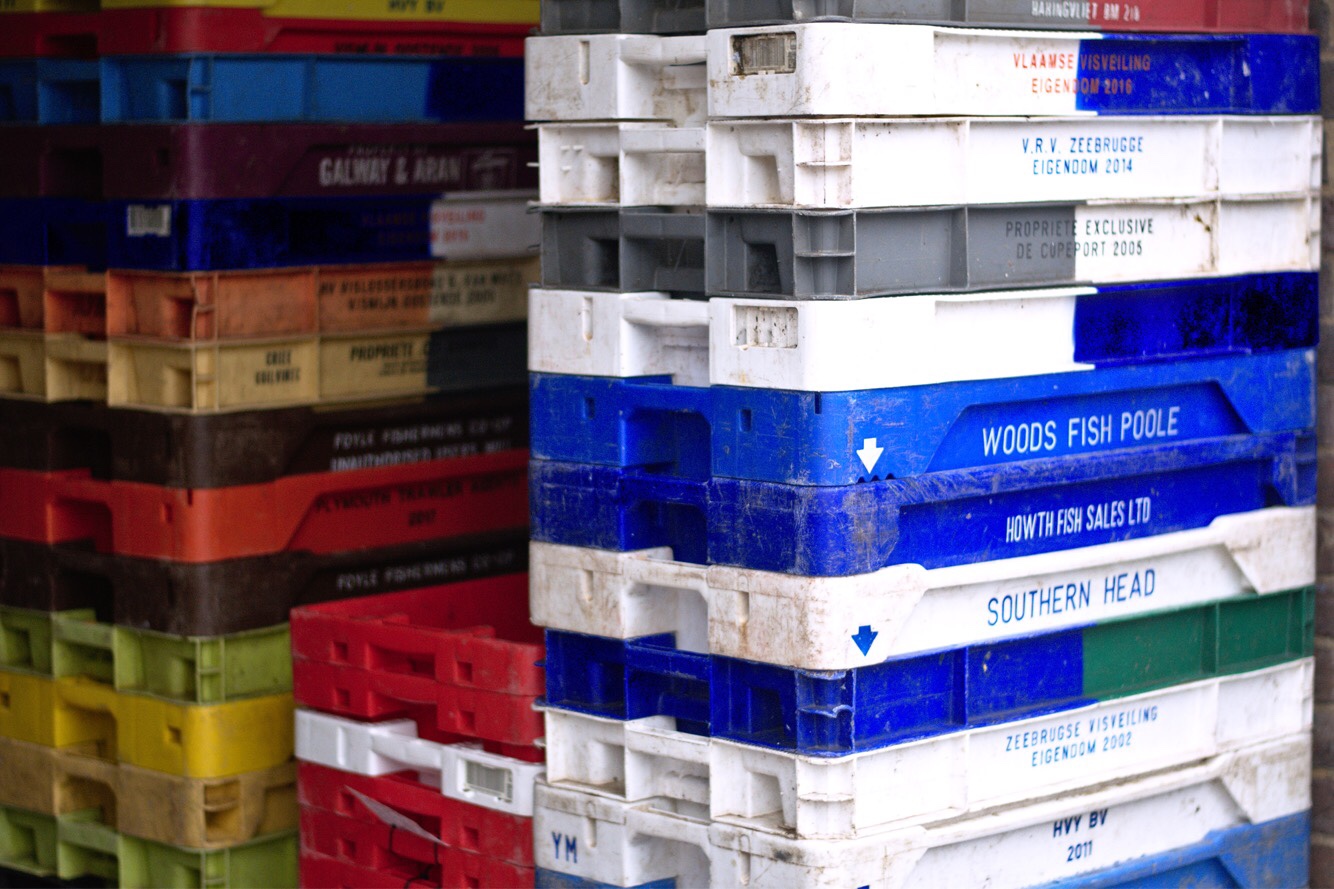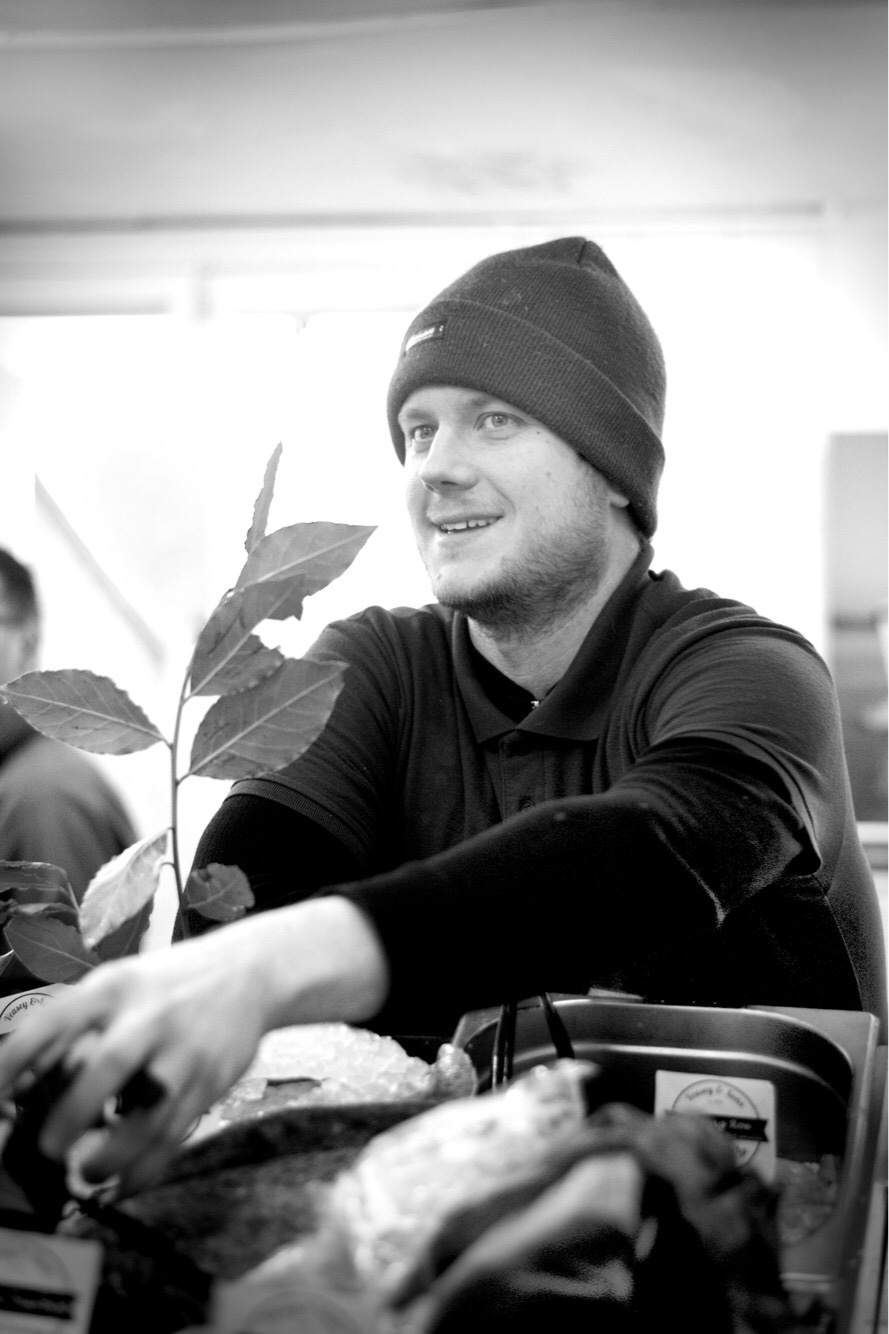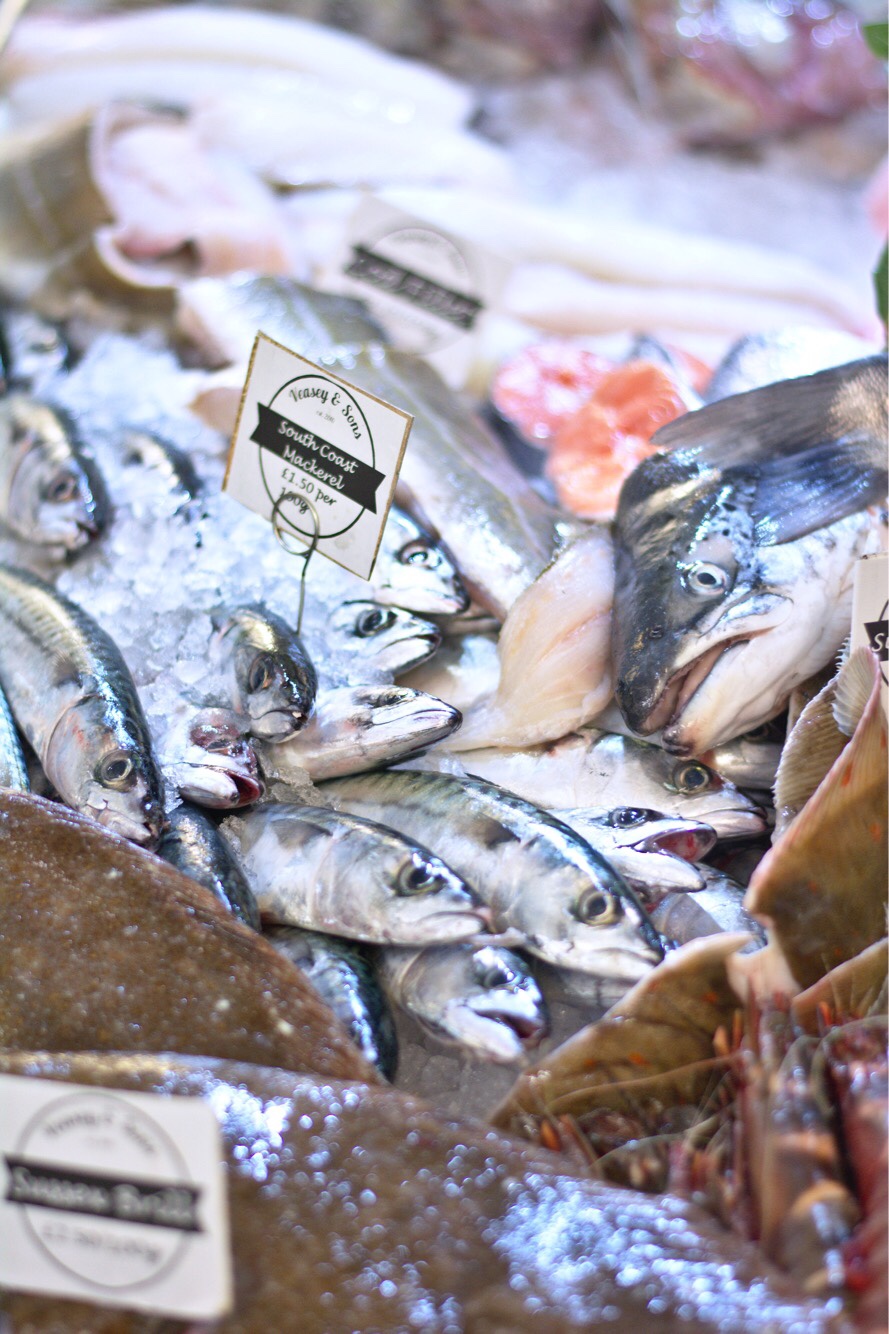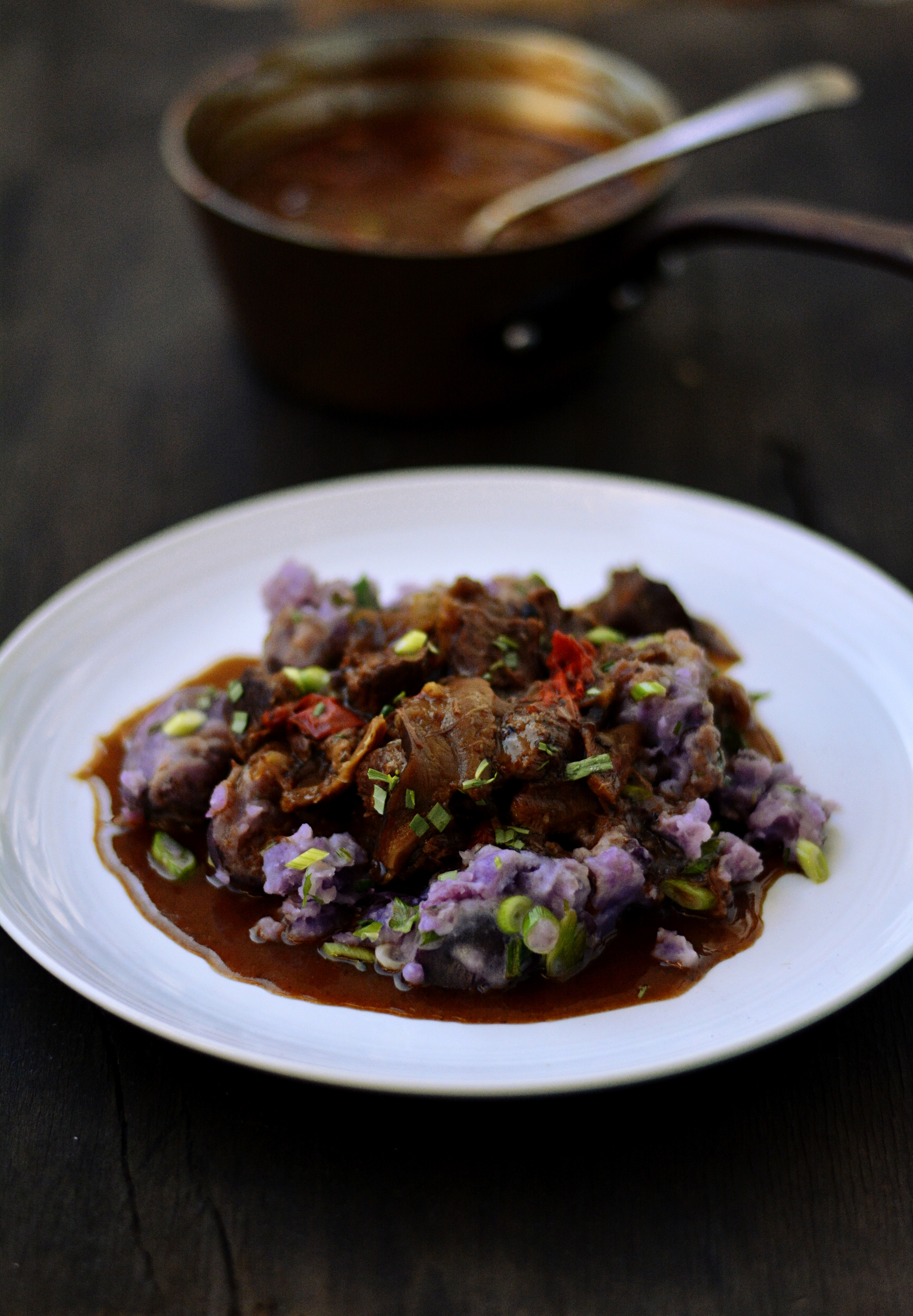
It changes your attitude, somewhat, to the fish you're eating when you know the name of the fisherman who caught it. Joe caught my bass, out on the stormy seas while I was pottering around my warm kitchen with a cup of tea that didn't throw itself across the room every ten seconds as the house hit a wave That adds a whole new level of respect as I place the fish in the hot pan.
The crew of the day boat 'Le Belhara', owned by Chris Veasey, fish out of Eastbourne, and the catch makes its way to Veasey and Sons Fishmonger, in Forest Row, East Sussex, about 30 miles from the coast. Chris opened the shop, housed in a former butcher's, with son-in-law Dan Howes eight years ago after success at the East Grinstead Farmers' Market.
While the day boat sails from Eastbourne, Dan and his colleagues staff the bright, yet cosy feeling shop on the narrow road that leads out of the village to Hartfield. An elderly man and lady whom I assume to be his wife by the way they argue, looks at me standing over the mussels and says "We're very fortunate to have this fishmongers in the village." I nod back and mumble something about my good luck that they are at the market every Saturday where I live.
I first discovered them when they started their crushed ice-laden fish stall at the Crystal Palace food market four years ago and finally got round to visiting them last week. They now have ten market stalls every week as well as the shop and are spreading their passion for quality fish wherever they go.
It's a privilege to be able to buy such good fresh fish minutes from my house in London on a Saturday morning. One of my great disappointments in life is how much of our amazing seafood gets exported. But that's because The Europeans seem to respect fish more, it's more part of their daily diet than here, where we stretch mainly to cod and chips on a Friday or fish fingers for the children. Fish and chips is all very well, but the chips must be hot, salty and spiky with vinegar, the sea should be no more than 15 metres away while you eat them and the weather should be blustery.
But it's more a state of mind than a meal. In reality that state of mind often becomes a state of disappointment, apart from the very occasional highlight at places such as Lewis' fish shop in very fishy town of Newlyn where it was so good we went a few times on our summer holidays last year.
Sadly, the price of fish is often serious injury or lives lost at sea, Dan explains as he shows me an x-ray from one of the fishermen's hands after an accident with a winch. Bones crushed and crunched out of shape, finger joints at right-angles, like a particularly gruesome skeleton pianist from a travelling horror show.
The cod is particularly good at the moment, Dan tells me as I eye what to buy. Bass, sitting firm on it's bed of sparkling ice crystals as if in a giant jewellery box has to come home with me, it looks too good to resist. I also take a meaty cod loin which a day later is shared with the family in a fish molee, rich with coconut sauce, onion and the hint of cinnamon, cardamon and clove. I'm generous like that. Home made fish cakes also fall into my bag, a quick supper for when we've been out all day.
And last, I also ask for a bag of mussels, which, coincidentally, was the nickname I always wanted. A few large handfuls go in, they clack and knock together as they slip into the bag, looking like shiny black pebbles on the beach as the waves ebb away.
The bass will be dusted in flour and cooked in darkening butter. A squeeze of lemon may be enough, but I'm always a fan of salsa verde or a herb-laced olive oil. One of the best things about fish is that you can have supper on the table in about ten minutes if you get yourself together. The molee I made was ready in the time it took for the rice to cook, and the mussels, which I had for lunch today were ready in less than five. You can't even get fast food that fast. Just remember where it came from as you enjoy it.
Mussels with miso and n'duja broth
Ingredients for two people
A bag of spanking fresh mussels (these keep in the fridge for up to a week if looked after)
2tbsp white miso paste
2tbsp n'duja
500ml hot water
1 shallot or small onion, very finely diced
1 clove of garlic, grated or crushed
A large splash of verjus to steam the mussels (white wine or water as an alternative; I prefer verjus which keeps better and is more interesting than the leftovers of some bad supermarket wine)
Olive oil
Salt to season
Method
Heat a heavy, lidded saucepan and add the verjus followed by the mussels. Put the lid on and steam until they have opened, this should only take a couple of minutes. Remove from the heat.
Meanwhile, sauté the shallots and garlic in a little olive oil until soft, season well. Add the miso and n'duja and a splash of hot water and mix well to a creamy paste. Add the rest of the water, mix well and bring to just below the boil. Remove from the heat and pour into the mussel pan. Stir gently and serve straight away. Possibly with some crusty baguette if you fancy.







 The slow change from vivid green to red, yellow, orange. And then how quickly the trees become bare and the glorious colours give way to brown and grey sludgy streets.In the seemingly few hours of daylight we have over the winter months we celebrate the warmth of the fireside. Scarves, gloves, hats and thick woolen jumpers wrapped around us keep us cosy when we venture outside, often leaving and returning home in the dark.I welcome the smells from the slow cooker more than any dog's wagging tail as a greeting. And here we are, only at the gentle tip of the cold months, yet it feels like it's the time for stews. Meat falling from bones into rich and thick broths, individual flavours combining like the instruments in an orchestra to create one symphony.A cast-iron pan with a lid in a very low oven does just as well as a slow cooker, and if you're happy leaving the oven on all day it's the perfect way to cook. However, you may not fancy chopping and browning chunks of meat while drinking your morning coffee and wondering why you have to ask the children twenty times to put a sock on. I have neither the time nor inclination, getting out of a warm bed is tragedy enough. In which case these are best done the night before, or on a weekend when you have a more leisurely start to the day.Of course white potatoes work just as well as the purple ones, which may be a little tricky to find; crushed Anyas would be a real treat. Whatever you use, nothing quite beats the deliciousness of all those juices soaked up by the buttery potatoes. This really is one of those meals that feels like you're back home in the warmth of the family.Tarragon adds a little last of the summer sparkle to the flavours, hinting with its warm aniseed at the comfort to come. If you don't have any, a good handful of chopped parsley running through would be just as nice.Ingredients500g ox cheek, cut into chunks1 onion, roughly choppedA thumb of ginger, chopped1tbsp oregano1tbsp flour1/2 a bulb of garlic1 red pepper, chopped2tbsp tomato purée500ml beef stockLarge pinch of dried mushroomsSalt and pepperPotatoes to serve, cooked and crushed with butter, spring onion and some shredded tarragon.MethodHeat a heavy sauté pan with some oil and sear the beef well until browned. Try not to smoke out the kitchen and set of the smoke alarms in a panicked succession as I did. And sear the meat in batches to avoid boiling rather than caramelising it.Add the flour and stir well, coating all the meat. This will help thicken the sauce. Add to the slow cooker or casserole. Deglaze the sauté pan with a little water or wine and add the juices along with the remaining ingredients.Cook on high for four hours or low for eight hours in the slow cooker, or eight hours in a very low oven. (140c. Gas mark 1) Serve with the potatoes and perhaps some broccoli or garlic green beans.
The slow change from vivid green to red, yellow, orange. And then how quickly the trees become bare and the glorious colours give way to brown and grey sludgy streets.In the seemingly few hours of daylight we have over the winter months we celebrate the warmth of the fireside. Scarves, gloves, hats and thick woolen jumpers wrapped around us keep us cosy when we venture outside, often leaving and returning home in the dark.I welcome the smells from the slow cooker more than any dog's wagging tail as a greeting. And here we are, only at the gentle tip of the cold months, yet it feels like it's the time for stews. Meat falling from bones into rich and thick broths, individual flavours combining like the instruments in an orchestra to create one symphony.A cast-iron pan with a lid in a very low oven does just as well as a slow cooker, and if you're happy leaving the oven on all day it's the perfect way to cook. However, you may not fancy chopping and browning chunks of meat while drinking your morning coffee and wondering why you have to ask the children twenty times to put a sock on. I have neither the time nor inclination, getting out of a warm bed is tragedy enough. In which case these are best done the night before, or on a weekend when you have a more leisurely start to the day.Of course white potatoes work just as well as the purple ones, which may be a little tricky to find; crushed Anyas would be a real treat. Whatever you use, nothing quite beats the deliciousness of all those juices soaked up by the buttery potatoes. This really is one of those meals that feels like you're back home in the warmth of the family.Tarragon adds a little last of the summer sparkle to the flavours, hinting with its warm aniseed at the comfort to come. If you don't have any, a good handful of chopped parsley running through would be just as nice.Ingredients500g ox cheek, cut into chunks1 onion, roughly choppedA thumb of ginger, chopped1tbsp oregano1tbsp flour1/2 a bulb of garlic1 red pepper, chopped2tbsp tomato purée500ml beef stockLarge pinch of dried mushroomsSalt and pepperPotatoes to serve, cooked and crushed with butter, spring onion and some shredded tarragon.MethodHeat a heavy sauté pan with some oil and sear the beef well until browned. Try not to smoke out the kitchen and set of the smoke alarms in a panicked succession as I did. And sear the meat in batches to avoid boiling rather than caramelising it.Add the flour and stir well, coating all the meat. This will help thicken the sauce. Add to the slow cooker or casserole. Deglaze the sauté pan with a little water or wine and add the juices along with the remaining ingredients.Cook on high for four hours or low for eight hours in the slow cooker, or eight hours in a very low oven. (140c. Gas mark 1) Serve with the potatoes and perhaps some broccoli or garlic green beans.
